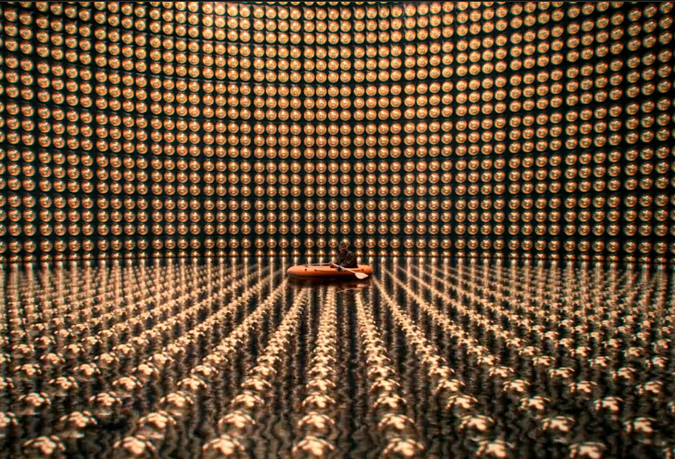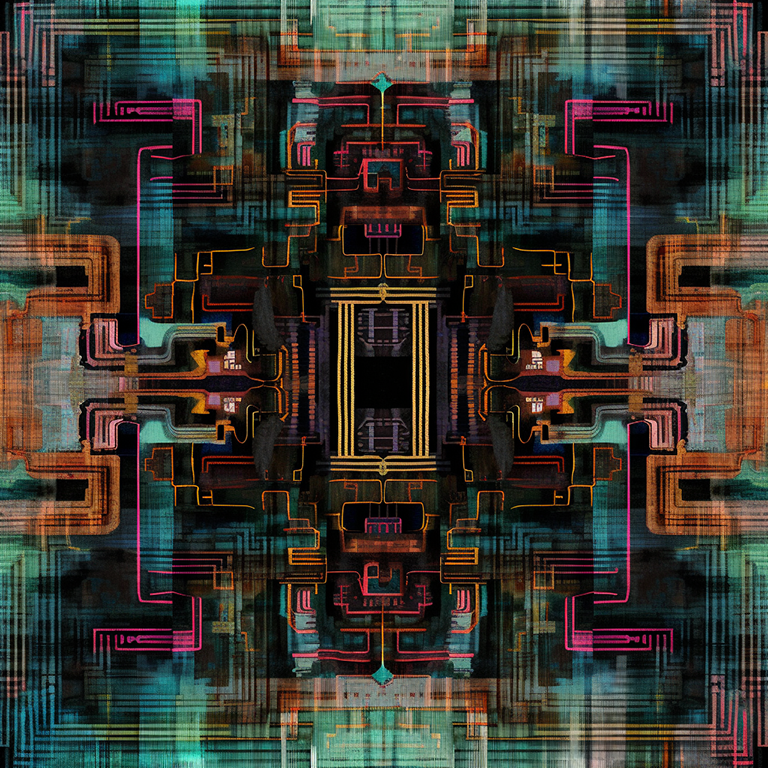
Neutrino Catcher
Super-Kamiokande Neutrino Catcher developed by the ICRR
Embracing Kinship: Interconnected Interiors in the Metaverse creates a virtual reality experience where users can explore and interact with various interconnected virtual spaces while fostering a sense of community and shared experiences. We propose a series of interconnected interiors generated by ongoing discussions and community agreements around belonging, and rituals that connect us.


We believe AI can be a powerful support in the creative process. We are excited to explore its potential within interior design and have used this collection to explore the possibilities and to open discussions. In each instance that it was used, we lead with transparency. As designers, we see AI as part of our design process but not the end result. Where it was used as the end product, authorship is given to the platform and general prompts are shared. These are cited and credited as contributions. For instance, AI was used to generate the rugs of this collection, prompted and trained on images by Michele Gorman and Madina Masimova. In another instance, it was used to generate ideas on spaces of belonging and inclusion for us, as authors of the collection and the Metaverse spaces, to critique and design from. For text, it was used to summarize our research and for us, as authors, to elaborate on and edit. For all contributors to this collection, if AI is used at any stage in the creation of your project (including initial stages, idea generation, rendering, language translation, and final form), it should be properly cited and disclose its use. This should include details on the specific tool and version used, as well as the nature of your usage (for example, in programming code, images, and/or text/writing). For Chat contributions in other languages, we recommend AI for language translation. We hope this will enable a space of belonging and sharing.
Embracing kinship represents the idea of fostering a sense of community, connection, and togetherness within the Metaverse. It suggests that the users of our virtual interiors are encouraged to form relationships, collaborate, and support each other. Creating a virtual reality experience where users can explore and interact with various interconnected virtual interiors while fostering a sense of community and shared experiences.
Prompted by co-authors, Michele Gorman and Madina Masimova, to create spaces that engage a sense of collective belonging in the Metaverse through a shared experience and emerging conversations. The space’s signature interior element is the domestic rug. This emerged from Masimova’s relationship to the domestic rugs of Azerbaijan, recognized as an Intangible History by UNESCO, where the shared space, defined by the boundary of a traditional rug, could be reconfigured based on different cultural rituals and bodies. The rug, and its place in the interior, connects us across cultures. We see the rug, and its patterns, as a cultural space of gathering, sharing and co-authorship in the Metaverse that connects us between our global locales, spaces and times. The authors generated each rug with the prompt: patterns that connect. They used text to image prompts through Artificial Intelligence (Midjourney) to create a globally co-authored surface to enter as a spawn point into each space.
Each space is inspired by rituals that connect such as listening rooms, tea ceremonies, dinner parties that drive the typologies of our interconnected interiors. A set of community agreements, entered through the Dinner Party room, drives the theme and interaction prompt of each room. We see the metaverse interior as a spatial way to learn, and add to activate and embody the community agreements. We use the Dinner Party as a space of belonging or offering. Each plate represents a community agreement and is hyperlinked to text and rooms. Each room will collect, over time, a set of curated Metaverse interiors that support, extend or challenge these agreements of a radically inclusive Metaverse.
What is the future of Interiors and interiority within the Metaverse?
As digital interiorists and feminists, we entered the Metaverse as techno utopian optimists. Excited about the future of the Metaverse as a space of liberation from the gender norms of the physical built environment, we quickly became critical of the spaces, experiences and interactions we were encountering. We engaged in global Metaverse events and design award ceremonies within Decentraland, AltspaceVR, Spatial, VRChat. In sharing stories of bullying, hypercapitalism, and the loneliness we felt when roaming events and spaces, we felt kinship in our visioning of a radically inclusive Metaverse future. If the interior is intended to elevate the human experience, create a space of connections, we created spaces of ethical alterierity in Metaverse. We asked: what would spaces look like where we can share knowledge, to heal, to listen, to commune?
We see the future of this space as one of radical belonging: a space of new emerging connections and communities; spaces of global collaboration on the climate crisis; spaces of liberation; spaces of expanded and the pluriverse of identities, towards gender and racial justice, that will move out of the Metaverse and into the physical world; spaces of connection between physical and virtual worlds.
We contemplate what a space of belonging, togetherness and community can be in the Metaverse. What does engagement look like when you may be the only one entering and engaging the space? How can you connect asynchronously with a larger community across space and time?
Community Agreements for a radically inclusive Metaverse future:
This work was done on the unceded land of the Munsee Lenape people in Brooklyn, New York and in Baku, Azerbaijan.
Gratitude:
We would like to thank Maya Georgieva, Director of The New School Innovation Lab, for her wisdom and insight around our co-taught Mixed Reality elective.
We would like to thank Johanne Woodcock for her support of an AI generated interiors collection on inside.inside.
We would like to thank the students of Mixed Realities for expanding these topics through dialogue and creative work.
We would like to thank our guests in Mixed Realities for being open to dialogue on the future of the Metaverse.
Rooms designed by Gorman and Masimova. Curated interior elements generated by AI or cited author with permissions.
Each room has been curated around a Community Agreement or emerging topic on radical belonging in the metaverse.
Room 2: Dinner Party / Community Agreements Room
Room 3: Be You / Digital Identity Room
Room 5: Join a Conversation, or start a new one, Room
We appreciate all meaningful feedback to make these spaces more welcoming for all.
We will continue to add / curate / connect interiors to this space, emerging topics and virtual interiors of the Metaverse. We have launched this collection in Mozilla / Hubs with emerging themes from our discussions, plus the curation of themes that we would like to explore within. Please return to see the spaces change over time and conversations emerging. We see this collection as living and growing. It’s alignment with our Mixed Realities elective will feed it’s research into this space
Please explore.
Please leave your thoughts in the form of text, hyperlinks, drawings, or objects.
Please connect if you have work you would like to share or highlighted in the collection at Michele Gorman and Madina Masimova (emails hyperlinked)
Join the conversation:
Embracing Kinship Discord Channel
#decoloniality-in-the-metaverse
#everyday-interiors-in-the-metaverse
#ecological-futures-of-the-metaverse
#spaces-of-protest-and-dissent
#radical-feminist-spaces-of-the-metaverse
#spaces-of-co-authorship-and-collaboration
#expanded-identities-of-the-metaverse
Mozilla / Hubs is most aligned with our ethics. There is no need to purchase cryptocurrency or “land” parcels to enter or to create. Free of the spaces of capitalism the current platforms of the Metaverse promote, we critique platforms that require the purchase of cryptocurrency or NFTs. We promote spaces of listening, making and contributions, reframing the current approaches to the Metaverse. The selling of land in the Metaverse also amplifies colonialist approaches to space. What does a space of sharing and belonging look like?, creating an alternative to the approaches we currently see.
As the platform that we are using is not entirely meeting this future, we use the medium as a way to present work that proposes new radical futures of the Metaverse and explores what is possible. It is our hope that our students build on this research and find future potentials of spaces of radical belonging within these spaces, and continue to make, share and liberate themselves to find real connections and communities to challenge the built environment.